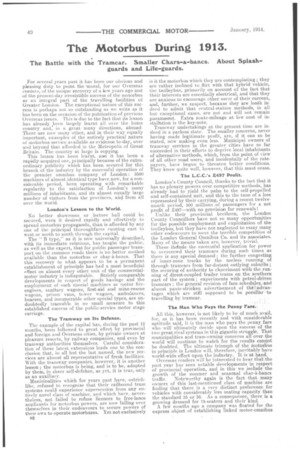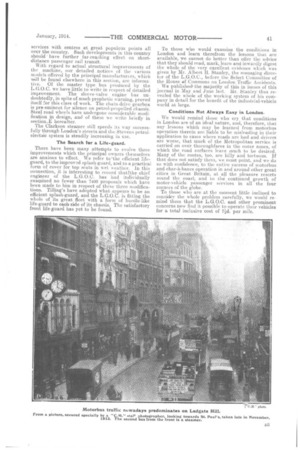The Motorbus During 1915.
Page 42

Page 43

If you've noticed an error in this article please click here to report it so we can fix it.
The Battle with the Tramcar. Smaller Chars-a-bancs. About Splashguards and Life-guards.
For several years past it has been our obvious and pleasing duty to point the moral, for our Overseas readers, of the unique recovery of a f,:ew years ago and of the present-day irresistible success of the motorbus as an integral part of the travelling facilities of Greater London. The exceptional nature of this success is perhaps not so outstanding as we write as it has been on the occasion of the publication of previous Overseas issues. This is due to the fact that its lesson has already been largely learnt all over the home country and,' in a great many directions, abroad. There are now many other, and in their way equally important, examples of the entirely practical nature of motorbus service available as evidence to-day, over and beyond that afforded in the Metropolis of Great Britain. The country at large is copying. This lesson has been learnt, arsd it has been a rapidly-acquired one, principally because of the extraordinary publicity which has been secured for this branch of the industry by the successful operation of the premier omnibus company of London : 3500 machines of almost identical type have now, for a considerable period, been operating with remarkable regularity to the satisfaction of London's many millions of inhabitants, and its almost equally large number of visitors from the provinces, and from all over the world.
London's Lesson to the World.
No better showroom or lecture hall could be secured, were it desired rapidly and effectively to spread motorbus propaganda, than is afforded by any one of the principal thoroughfares running east to west or north to south through the capital.
The " B type," as it is now universally described, with its immediate relations, has taught the public, as well as the expert, that for public passenger transport on the common roads there is no better method available than the motorbus or char-k-bancs. That this recovery to what appears to be a. permanent establishment of principle has had a most beneficial A ff ect on almost every other unit of the commercialmotor industry is indisputable. Strictly comparable developments in respect of goods haulage and the employment of such special machines as motor fireengines, sanitary wagons, first-aid and mine-rescue wagons, prison vans, tower wagons, ambulances, hearses, and innumerable other special types, are undoubtedly traceable in no small measure to this established success of the public-service motor stage carriage.
The Tramway on Its Defence.
The example of the capital has, during the past 12 months, been followed to great effect by provincial and foreign and Overseas cities, by private owners at pleasure resorts, by railway companies and even 14Y tramway authorities themselves. Careful consideration of these latest extensions leads one to the conclusion that, in all but the last named, the new servicesare almost all representative of fresh facilities. With the tramway companies, however, it is another lesson ; the motorbus is .being, and is to be, adopted by them, in sheer self-defence, as yet, it is true, only as an auxiliary.
Municipalities which for y. ears past have, • ostrichlike, refused to recognize that their railbound tram systeins could experience supersession from any entirely novel class of machine, and which have, nevertheless, not failed to _refuse -licences to free-lance applicants for motorbus powers, are now falling over themselves in their endeavours to secure powers of their own to operate motorbuses. Yet not exclusively
D2 is it the motorbus which they are contemplating ; they are rather inclined to flirt with that hybrid vehicle, the taolleybus, primarily on account of the fact that their interests are essentially electrical, and that they are anxious to encourage other users of their current, and, further, we suspect, because they are loath indeed to admit that central-station methods, in all but eateeptional cases, are not and will not remain paramount. Extra route-mileage at low cost of installation-is the key-note.
Tramway undertakings at the present time are indeed in a parlous state. The smaller concerns, never having made legitimate profit, are, if it can so be stated, now making even less. Municipal owners of tramway services in the greater cities have so far succeeded in their efforts to deprive local inhabitants of alternative-methods, which, from the point of view of all other road users, and incidentally of the ratepayers, have begun to threaten better conditions. They know quite well, however, that this must cease.
The L.C.C.'s £497 Profit.
London's County Council, thanks to the fact that it has no plenary powers over competitive methods, has already had to yield the palm to the self-propelled and self-contained unit, and this to the tune of a loss represented by their carrying, during a recent twelvemonth period, 500 millions of passengers for a net profit of 2497—with no provision for renewals ! Unlike their provincial brethren, the London County Councillors have not eo many opportunities for the possible employment and exploitation of the trolleybus, but they have not neglected to essay many other endeavours to meet the terrible competition of the London General Omnibus Co. and its associates. Many of the means taken are, however, trivial.
These ifictude the successful application for power to overcrowd their tranicars during such times as there is any :special demand ; the further congesting of inner-zone tracks by the useless running of through tramcars from far-distant outlying suburbs ; the securing of authority to Aperinient with the running of direct-coupled trailer trams on the southern part of the system ; experiments with petrol-driven tramcars; the general revision of fare schedules,.-and almost panic-stricken advertisement of the advantages which are still supposed to be peculiar to travelling by tramcar.
The Man Who Pays the Penny Fare.
All this, however; is not likely to be of much avail, for, as it has been recently and with considerable aptitude said, it is the man who pays the penny fare who will ultimately decide upon the success of the two great rival systems in this gigantic struggle. That municipalities and tram-owning concerns all over the world will continue to watch for the results cannot be doubted. The ultimate triumph of the motorbus in principle in London will, therefore, inevitably have • world-wide effect upon the industry. It is at hand. Overseas readers will be interested to hear that the past year has seen notable developments in respect of provincial operation, and in this we include the growth of the summer and seasonal char-a-bancs
traffic. Noteworthy again is the fact that many owners of this last-mentioned class of machine are finding that there is a very distinct preference for vehicles with considerably less seating capacity than the standard 35 or 36. As a consequence, there is a growing demand for 15-seaters and their. kind.
A few months ago a company was floated for the express object of establishing linked motor-omnibus services with centres at great populous points all over the country. Such developments in this country should The Clarkson steamer still speeds its way successfully through London's streets and the Stevens petrolelectiiie system is steadily increasing in use. The Search for a Life-guard. There have been many attempts to evolve three improvements which the principal owners themselves are anxious to effect. We refer to'the efficient lifeguard, to the improved splash-guard, and to a practical form of cover for top seats in wet weather. In this connection, it is interesting to record that!the chief engineer of the L.G.O.C. has had individually examined no fewer than 7400 proposals which have been made to him in respect of these three modifications. Tilling's have adopted what appears to be an efficient splash-guard, and the L.G.O. Cl. is fitting the whole of its great fleet with a form of hurdle-like life-guard to each side of its chassis. The satisfactory front life-guard has yet to be found. To those who would examine the conditions in London and learn therefrom the lessons that are available, we cannot do better than offer the advice that they should read, mark, learn and inwardly digest the whole of the very excellent evidence which was given by Mr. Albert H. Stanley, the managing director of the L.G.O.C., before the Select Committee of the House of Commons on London Traffic Accidents. We published! the majority of this in issues of this journal in May and June last. Mr. Stanley thus revealed the whole of the working system of his company in detail for the benefit of the industrial-vehicle world at large. Conditions Not Always Easy in London. We would remind those who cry that conditions in London are of an ideal nature, and, therefore, that any lessons which may be learned from motorbus operation therein are liable to be misleading in their application to cases where roads are bad and drivers arc worse, that much of the Metropolitan service is carried on over thoroughfares in the outer zones, of which the road surfaces leave much to be desired. Many of the routes, too, are hilly and tortuous. If that does not satisfy them, we must point, and we do so with confidence, to the entire success of motorbus and char-h-loancs operation in and around other great cities in Great Britain, at all the pleasure resorts yound the coast, and to the continued growth of motor-vehicle passenger services in all the four corners of the globe. To those who are at the moment little inclined to consider the whole problem carefully, we would remind them that the L.G.O.C. and other prominent concerns now find it possible to operate their vehicles for a total inclusive cost of VA. per mile.






















































































